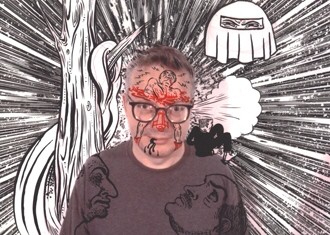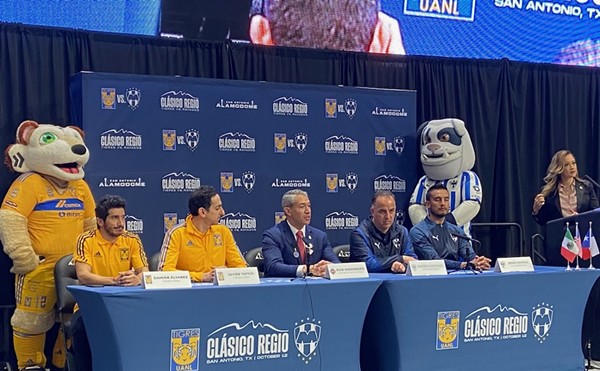| Some of Mark Mothersbaugh’s extra-Devo pursuits are on view at Fl!ght this month. Courtesy photo. |
| Mark Mothersbaugh By appt. Through Jun 1 Opening reception: 6:30pm Sat, May 12 Fl!ght Gallery 1906 S. Flores 872-2586 Turnitoff.tv |
Read on to find out what Crawdaddy's got to do with a cultural permutation that helped make irony the lexicon of our times and turned a particularly chunky pair of Oxford eyeglass frames into a pop-art icon. If you want to preview the show that opens at Fl!ght this weekend, or learn more about Mothersbaugh's extra-Devo television and movie scores (which include Pee-wee's Playhouse and Wes Anderson's oeuvre) visit Mutatovisual.com.
This interview, which took place over the phone between a caffeine-deprived Mothersbaugh and a Best-of-SA-deadlined Current, has been edited to make both parties look a little more on the ball.
Well, let's talk a little bit about art and commodification. I'm sort of curious: What role do you think art serves now, or how can art stay separate from the marketplace? Should it even try to?
Say that again?
One of the things I think about a lot is how the art world and the commercial world have gotten a lot closer, maybe in the past 25 years or so, to the point that a lot of times you don't even see a difference. Do you think that should be of concern for artists? Does it matter?
OK, here's my feeling about that: I grew up during a time when the people that were exciting to me that were artists were people like Andy Warhol, and Roy Lichtenstein, and Rauschenberg, people that were taking - to a much further extent than the Dadaists - they were taking things out of pop culture and representing them, and putting a twist on them, and making you look at commercial art or commercial culture through an artistic lens, and I think it started in a big way around the time of Andy Warhol and pop art, and then it just turned into a crazy virus by the time MTV showed up.
Well, the critical aspect of it seems to have been lost.
Yes. Um, I'm not sure where you're going with this ...
No place in particular.
No place in particular?
I don't have an end goal in mind if that's what you mean.
OK. Being in a band I certainly know what it's like to be straddling the fence between fine art and commercial art. We did it on purpose because we liked the idea of mingling those two effects, and I mean to the point where, when I was younger and I was in a place where I was just starting to figure out what Devo was and what we were trying to do with Devo, and when I was a visual artist, doing gallery shows at the time - this was like 1970 - I remember an ad campaign where Burger King latched onto Pachelbel's "Canon" for a theme song, and they turned it into `singing` "Hold the pickles, hold the lettuce, special orders don't upset us, all we ask is that you serve it your way." and I remember thinking, "That's perverted," and loving it.
That was after Ordinary People, wasn't it?
That was probably a time in my life when I was searching out pink flamingos, and Eraserhead, and Clockwork Orange and things like that. So Ordinary People I might have missed. But what I liked about that ad campaign is it didn't stop there. It turned into `singing at a faster tempo` "doon doon doon, doon dicka boom dicka boom boom boom boom, "Hold the pickles, hold the lettuce, special orders don't upset us," and they just kept taking the song further and further, so this kind of piece of inspirational religious music turned into an anthem for cheap hamburgers. And when I was 20, that cracked me up, I loved that, and I loved the idea of mixing those worlds together. I even quoted those lyrics in a song on our first album, because of being impressed by that commercial.
Part of the reason why I liked the idea of fine art commingling with commercial art is because I grew up during a time of the hippies, and although we didn't have a summer of love in Ohio - we had a summer of hate; we were in a cultural wasteland - I could see all the stuff that was going on - we had Crawdaddy and Rolling Stone magazines - so we could see what was going on in the rest of the world. We knew that there was a Haight-Ashbury and a Sunset Strip, and a Carnaby Street and a Village in Manhattan. And we watched what was going on, but we watched the hippies become commodified. We watched hippies turn into hip capitalists; they became subverted by capitalism instead of overthrowing it, and they became just another product to sell.
So when we started our band, we didn't really identify with punks, we didn't really think anarchy was the way to go, committing suicide - although it seems to be very effective these days to take yourself out and to take somebody else out with you - but we ended up thinking subversion was the way to really change things in our culture, and that's where our interests came into looking for that line that you could straddle, and that you could find a way to put a new meaning on a public product or entity.
I don't know what I'm talking about right now. See, this is what happens when you don't have coffee.
When you look at pop culture right now, do you see anything that you think, Yeah that's brilliant, I love that? In any medium, whether it's a YouTube video, or a television show, or a musician ...
You know, I don't really watch enough television anymore. Even though I've scored and written theme songs for more than 65 different TV series, I don't watch it. There's probably something good somewhere there.
Well, when you're scoring you must watch pilots, or do you just talk about the concepts?
Well I mostly do films now. I do TV shows - I might do one a year at the most - but I mostly do films now, and games.
Do you spend much time playing games?
No. I've been making up games though, or should I say anti-games. I haven't put any of them out yet, but I have a couple of them that probably in the next year they're going to rear their ugly heads and you'll find out about Spud Butt and Head Humpers and a couple other ones that are already put together. I'm just trying to figure out what the best arena is to present them in.
Is Head Humpers interactive?
What?!
Is Head Humpers interactive?
Inter ... yeah! Yeah.
So what makes an anti-game?
They're almost Dada parodies in a way. One of them - nobody dies, first off, you can't steal anything, you can't blow anybody's limbs off - one of them you do try to not get killed, because there's a little evil gremlin Head Humper that's running around the halls of this apartment building that you've been hired to become the building manager of, and you're trying to fix it up and deal with problems, and there is a gremlin you have to avoid.
Will the graphic style be reminiscent of your artwork ...
Postcard artwork, yeah. That's where all the images came from. As a matter of fact, it was kind of - I hate telling you this because it's so far in advance - but the idea behind it was to do an interactive graphic novel in a way, because I keep getting asked to do graphic novels, and my weakness, which I don't like to brag about, is that really low on my list of talents is my ability to draw the same character so that they look like the same character from different angles. What can I say?
Ed. note: The "Have it your way" campaign debuted in 1974; Ordinary People, which won four Oscars and was scored with Pachelbel's "Canon in D major," was released in 1980.
















